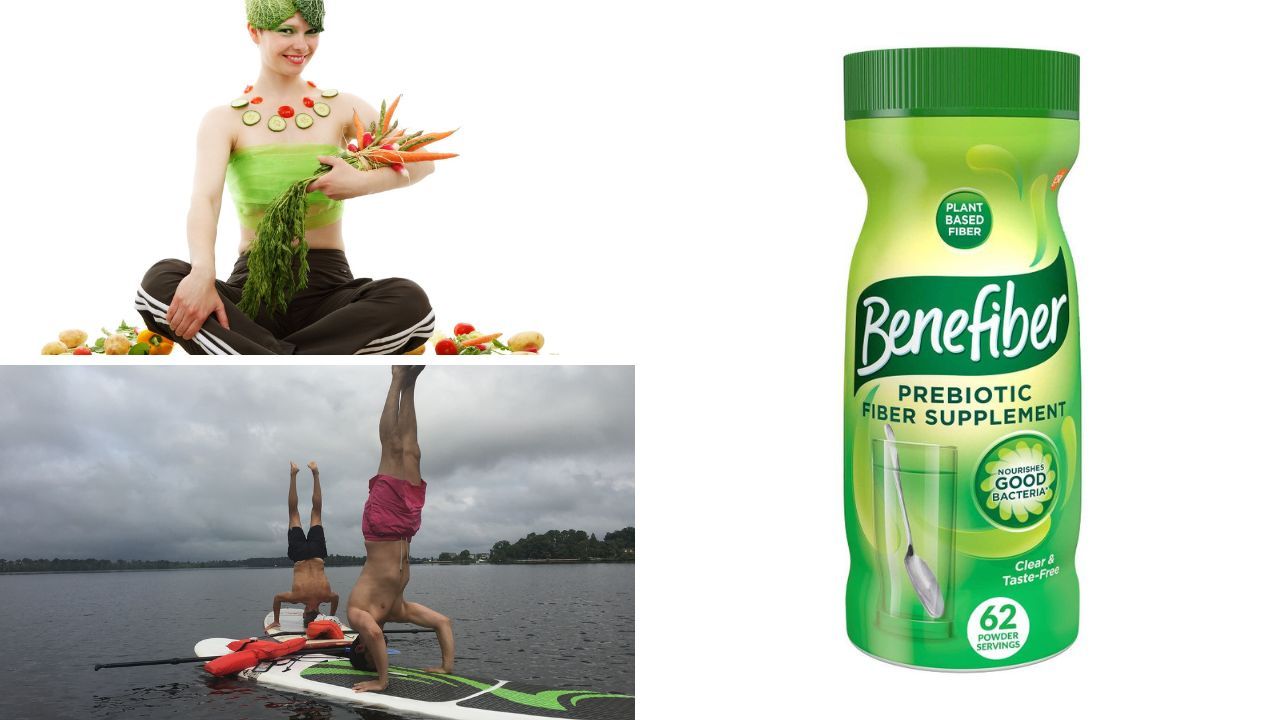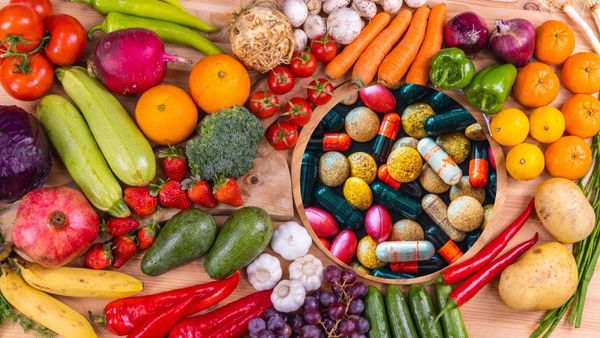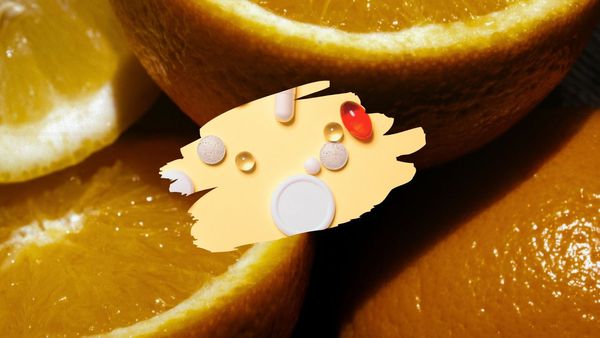Did you know that fiber can help you maintain a healthy weight, reduce your risk of heart disease, and regulate your digestive system?
Fiber supplements can help fill crucial gaps in your diet, if you're having trouble getting enough fiber from whole foods.
Fiber helps keep your digestion regular and supports a healthy gut microbiome, but only if you get enough of it. Fiber supplements are easy to add to your daily routine. They're also usually more affordable than many whole-food sources of fiber.
While most people know they should be eating plenty of fiber every day, figuring out exactly how much is a challenge for even the most seasoned nutrition expert. The majority of Americans don't eat nearly enough fiber each day—the recommended minimum is 25 grams per day for about how many grams for women and 38 grams per day for men—and that's before factoring in age, weight loss or any special dietary concerns like inflammatory bowel disease (IBD).
Now that we've got your attention, let's dive into our list of the best fiber supplements available. We'll explore the benefits and drawbacks of each product to help you make an informed decision. Whether you're looking for a powder, capsule, or gummy, we've got you covered.
We'll also highlight the unique features of each supplement that will make you want to try them out for yourself. From easy-to-swallow capsules to delicious gummies, we've got a supplement for every preference.
With our guidance, you'll be able to find a fiber supplement that meets at least half or all of your dietary needs and helps you achieve optimal health. Don't wait any longer - it's time to take action and improve your health with the best fiber supplements on the market!
Here are our Top Picks, which we hope you will enjoy reading about. Each product on this list has been hand-picked by an editor. All opinions on this post are our own. Moreover, we wanted to inform you that - Dapper Digests may receive a share from sales from links on this blog if you decide to purchase anything (It's how we remain in business). We edit all of our reviews to make them easy to read and concise so that you Never Miss Another Great Find Again!
How We Selected The Best Fiber Supplements
Get ready to say goodbye to digestive issues and hello to a healthier gut! We've done the hard work for you by reviewing all of the top fiber supplements on the market.
From powders to capsules to liquids, we've taken a deep dive into the ingredients, customer reviews, and overall quality to bring you the best options available.
With our help, you can confidently choose a fiber supplement that will improve your digestive health and help you feel your best.
So let's dive in and find the perfect supplement for you!

Garden of Life Raw Organic Fiber Powder
Best Supplement With 15 Organic Superfoods, Probiotics and Omega-3 ALA
Why We Suggest It
We're thrilled to share with you our latest discovery - Garden Life's Raw Organic Fiber supplement! This incredible powder is a game-changer when it comes to getting your daily dose of fiber.
What sets it apart is its unique blend of 15 raw and organic superfoods, including sprouted seeds, grains, and legumes like flax, quinoa green beans, and chia. You won't find any fillers or sugar in this top-quality supplement.
With Garden Life's Raw Organic Fiber, you can nourish your body with the goodness of nature and enjoy a healthier, more vibrant life!
Learn More About It
Looking to boost your fiber intake in a delicious and healthy way? Look no further than Garden Life's Raw Organic Fiber supplement! This amazing powder is made with 15 raw and organic superfoods like flax, quinoa brown rice, and even chia seeds. With no filler ingredients or added sugar, you can rest assured that you're getting only the best quality ingredients.
With 9g of fiber per serving (32% DV), 8g of protein, probiotics, and Omega 3 fatty acids, this supplement provides a well-rounded boost to your overall health. Plus, the sprouted seeds in this supplement contain essential nutrients such as protein and healthy fats that you won't find in non-sprouted versions.
So if you're looking for a budget-friendly way to increase your daily fiber intake without any unnecessary calories or fat, Garden Life's Raw Organic Fiber supplement is the way to go! Don't wait, try it out today and feel the difference.

Meta MUCIL Fiber Supplement
Best Gluten Free Psyllium Husk Powder, Orange Smooth Sugar Free
Why We Suggest It
Get ready to revolutionize your digestive health with Metamucil, the powerful fiber supplement that will help you achieve regularity like never before!
Packed with the goodness of psyllium fiber, Metamucil will provide your body with the support it needs to maintain a healthy gut and overall wellbeing.
Say goodbye to uncomfortable digestive issues and hello to a happier, healthier you with Metamucil!
Learn More About It
Looking for a fiber supplement that not only promotes digestive health but also helps you control your appetite? Look no further than Metamucil! With its plant-based psyllium fiber, this supplement is perfect for anyone with dietary restrictions.
Plus, it's sugar-free, making it a very healthy snack choice for anyone watching their sugar intake. While it may not be the absolute best option for a sugar-free supplement, the plant-based benefits more than make up for it.
Give Metamucil a try today and see the benefits for yourself!

Sunergetic PSYLLIUM HUSK
Best Unflavored Supplement For Digestive Health Support
Why We Suggest It
Looking for an easy way to increase your fiber intake? Look no further than Sunergetic Psyllium Husk Fiber Capsules! Made from the seed husks of the Plantago ovata plant, these capsules are a convenient way to get all the benefits of fiber without having to chew or mix anything.
And with GMP certification, you can trust that you're getting a high-quality product that's good for your digestive health.
Try Sunergetic Psyllium Husk Fiber Capsules today and see the difference for yourself!
Learn More About It
Looking for a convenient and tasty way to get your daily dose of fiber? Look no further than Sunergetic Psyllium Husk Fiber Capsules!
These little capsules pack a big punch with a satisfying crunch and delicious taste. Made from ispaghula seed husks, they're high-quality and certified by GMP.
Not only do they help support regularity healthy digestion and digestive health, but they also make you feel full all day long.
So why wait? Get your Sunergetic Psyllium Husk Fiber Capsules today and start feeling your best!

NOW Supplements Psyllium Husk Caps
Best Vegan Natural Soluble Fiber For Intestinal Health
Why We Suggest It
Looking for a natural fiber supplement to support your keto diet? Look no further than Now brand's psyllium husk capsules! These capsules are made from non-GMO plant sources and have no additives or preservatives, making them a clean and pure option for your dietary needs.
Plus, with their high fiber content, they'll drink plenty to help keep things moving and keep you feeling full and satisfied.
Don't let constipation or sluggish digestion slow you down on your keto journey – try Now psyllium husk capsules today!
Learn More About It
Looking for a fiber supplement that fits your dietary needs? Look no further than Now's psyllium husk capsules! These capsules are sourced from non-GMO plants and are free from any additives or preservatives, making them perfect for health-conscious individuals.
They're vegan-friendly, gluten-free, and soy-free, so you don't have to worry about any artificial ingredients. The 3-serving pack is convenient to take on-the-go, and the capsules are easy to swallow, so you won't have to deal with any unpleasant textures or tastes.
Start taking them with water and enjoy the benefits of regularity and digestive health today!

Benefiber Prebiotic Fiber Supplement
Best For Digestive Health & Daily Fiber Powder
Why We Suggest It
Looking for a fiber supplement that not only supports your digestive health but also promotes the growth of good bacteria in your gut? Look no further than Benefiber Daily Prebiotic Fiber Supplement Powder!
Packed with wheat dextrin, this powder acts as a prebiotic and helps to nourish the good bacteria in your system. With regular use, you'll notice improved regularity, increased fullness, and better overall digestive health.
Add Benefiber to your daily routine today and start eating feeling your best from the inside out!
Learn More About It
This amazing powder is packed high fiber diet along with wheat dextrin, a prebiotic that helps promote the growth of good bacteria in your digestive system for optimal health.
Not only is this supplement effective, but it also tastes great and can be easily mixed into your favorite drinks or foods without any fuss. And with its unflavored form, you have the freedom to customize it to your liking.
Although it's best to take on an empty stomach to maximize its effectiveness, the slight laxative effect is a small price to pay for the benefits it provides. Plus, with its affordable price point, it's a no-brainer to add this to your daily routine. Trust us, you won't regret it!
FAQs About Fiber Supplements
As important as it is to incorporate fiber into our diet, it can be overwhelming to navigate the plethora of fiber supplements available in the market. Misinformation and ambiguity regarding their effectiveness and safety only add to the confusion.
That's where we come in – our team has thoroughly researched and vetted the best fiber supplements out there, so you can make an informed decision without any hesitation.
To clear up any doubts, we've compiled a list of frequently asked questions about our top picks. So sit back and let us guide you through this maze of fiber supplements!
What Is The Best Form Of Fiber To Take?
Most fiber supplements will list their ingredients on the label, but it can be confusing to know which type of fiber those are. There are two main types of fiber: insoluble and soluble. Both types have different health benefits, so it's important to choose a supplement that offers both kinds.
Soluble fiber absorbs water and turns into a thick gel in your digestive tract. This type of fiber is great for helping you feel full so you're less likely to overeat throughout the day.
It's also helpful for lowering your cholesterol levels since this type of fiber blocks some fats from being absorbed by your body. Some examples of soluble fibers include oat bran, inulin, lactulose and psyllium husk.
Insoluble fibers don't absorb water and turn into a solid waste product once they reach your colon. They help speed up your digestion by increasing movement within your intestinal tract. Some examples of insoluble fibers include: whole wheat flour, bran, corn bran, fruit pulp and beet pulp.
As long as you're getting enough soluble and insoluble fiber each day (about 15 grams), you'll get all the benefits offered by these vitamins in an easy-to-swallow pill form.
Is It OK To Take Fiber Supplements Daily?
It's generally recommended that you get your fiber from whole foods, but if you're having trouble doing so, taking a daily supplement can help. Most doctors recommend choosing a fiber supplement that contains psyllium husk because it absorbs the most water and helps relieve constipation.
If you have irritable bowel syndrome (IBS), it's OK to take a fiber supplement every day for relief of your symptoms as long as you work with your doctor to find the right dosage for you.
Some IBS medications may affect how well psyllium husk works for relieving constipation and improving movement in your bowels. Be sure to discuss any changes or additions to your medication plan with your doctor before adding a new supplement into the mix.
Is It Good To Take Fiber Supplements?
For individuals experiencing digestive issues, fiber supplements can be a valuable aid in restoring regularity and balance within the body.
This is particularly true for those affected by conditions that affect digestion, like irritable bowel syndrome (IBS), Crohn's disease, or colitis.
Soluble fiber found in these supplements can soften stool and prevent constipation, while insoluble fiber absorbs water in the digestive tract, promoting greater comfort after meals.
Do Fiber Supplements Make You Poop More?
When you eat more fiber than your body can handle, this is called “bowel over-expansion.” When this happens, it can be hard to go #2 and you might feel constipated.
Fiber supplements contain a lot of fiber so they're not really recommended if you have bowel issues. However, studies show that people who take the right amount of fiber supplements don't experience constipation or any other side effects like gas or diarrhea.
Which Is Better Metamucil Or Fiber Pills?
Fiber pills are a convenient option for those who need a quick and easy way to supplement their fiber intake. With high amounts of fiber per pill, they can be an efficient way to get the nutrients your body needs.
Some even include prebiotic ingredients, which can further support digestive health. However, it's important to note that fiber pills don't always have the best taste and can cause discomfort on an empty stomach.
It's essential to speak with your healthcare provider to determine the amount of fiber you need and which form of supplementation is best suited for your needs.
What Is A Good Fiber Pill To Take Daily?
There are many options when it comes to fiber supplements and the best choice depends on your individual needs. Here are a few things you should consider when choosing a fiber supplement:
Health conditions. If you have any health conditions, such as constipation, irritable bowel syndrome (IBS), or Crohn's disease, talk with your doctor about which type of fiber is right for you. Some types of fiber can cause side effects if you don't need them or don't tolerate them well. Your doctor may also be able to prescribe other medications that could help with your condition in addition to taking a fiber pill.
If you have any health conditions, such as constipation, IBS, or Crohn's disease, make sure the type of fiber you choose is right for your specific condition.
That way you can avoid potential side effects and symptoms associated with taking too much of the wrong kind of supplement. For example, psyllium-based fibers may not be suitable if you have irritable bowl syndrome since they can worsen this condition in some people.
If you aren't sure which type is best for your situation – talk to a doctor first and get their advice before trying out different kinds of pills! Fiber content per serving size.
Each brand and product will offer a different amount of total dietary fiber per serving size so make sure to read the label carefully before buying one product over another unless the higher amount fits into your budget!
You might be surprised how affordable lower cost brands can actually be compared to more expensive ones if they contain just as much per dose! Additional ingredients in each formula like probiotics and prebiotics might also influence what brand or product suits your personal preferences best too!
Cost versus benefit based on personal needs is essential no matter what decision we make but especially when it comes down to our health – never overlook this important factor by skimming over it!
Are Fiber Pills Or Powder Better?
The main difference between fiber pills and powder supplements is that the former contain fillers, which are added to keep the fiber from clumping.
The advantage of pills is that you can take them with water; the downside is that you have to deal with the consistency issues.
Powder mixes with your beverage of choice, so it's easier to consume. You can also buy pre-mixed products containing both pills and powder if you're looking for an all-in-one product.
Do Fiber Pills Work?
Fiber supplements can offer relief for constipation, but they cannot completely replace the benefits of consuming fiber-rich whole foods like fruits, vegetables and whole grains.
This is because whole foods provide a wide range of essential nutrients, vitamins, minerals and other healthy compounds that cannot be found in fiber supplements.
While fiber supplements can add bulk to your stools and promote regularity, they do not offer the same level of gut health benefits as real foods. In fact, relying solely on fiber supplements for your daily fiber intake can lead to less satisfaction over time.
It's important to note that while fiber pills may help some people manage digestive issues like irritable bowel syndrome (IBS), others may not experience significant relief from taking them.
Before starting any new supplement regimen, it's best to consult with your doctor to determine if it's the right choice for your individual needs.
What Is The Number 1 Source Of Fiber?
Most of us don't get enough fiber in our diet, but it's a nutrient that's essential for good health. The recommended amount is 25 to 38 grams per day for women and 38 to 62 grams per day for men, according to the Mayo Clinic.
The best sources of fiber include whole grains, beans, nuts and vegetables. However, these foods can be high in calories or may irritate certain digestive conditions like IBS. That's why many people turn to fiber supplements such as powdered psyllium husk.
This whole grain down-based powder absorbs water and turns into a gel when it reaches the colon – an area where you're likely deficient in fiber anyway due to constipation.
Psyllium husk is certainly one of the most popular sources of fiber because it works so effectively without causing side effects found with other products such as gas or bloating.
Other common forms of supplemental fiber include methylcellulose, acacia gum and starches like potato, wheat flour, or cornstarch.
Does Fiber Make Your Poop Hard Or Soft?
Fiber can help make your poop softer when it reaches your colon. When you digest food, it forms a sort of plug called a fecaloma that blocks the opening to your colon.
As time goes by, this plug gradually breaks down into smaller pieces until it turns into a soft, pudding-like substance.
While this is happening, your body also adds water to the mixture to create poops with a softer consistency. Once you have formed one or two hard poops, your body will push them out through your rectum and anus to finish the job.
Which Fiber Is The Healthiest?
Both types of fiber are important for health, but they affect your body in different ways. The type of fiber you should emphasize depends on your goals and diet.
Both soluble and insoluble fiber help with constipation relief by absorbing water and creating a soft, bulky stool that's easier to pass.
Soluble fiber is found in plant foods like oats, apples, beans, and citrus fruits. It turns into a gel when it mixes with water as it moves through the digestive tract.
This action can lessen blood cholesterol levels and relieve some types of constipation by forming a softer bowel movement.
Both soluble and insoluble fiber promote healthy gut bacteria by giving intestinal cells more bulk so they can hold more bacteria (called prebiotics).
Soluble fiber is better at lowering blood cholesterol levels than insoluble fiber because it forms a gel that slows down how quickly food travels through the digestive tract.
Eating fiber rich foods will do both actions but there isn't enough soluble fiber in most diets to achieve significant reductions in blood cholesterol levels.
What Is The Easiest Fiber To Digest?
The easiest fiber to digest is actually a combination of soluble and insoluble: whole grains. These combine the benefits of both soluble and insoluble fiber to give you energy without causing digestive discomfort.
That's because whole grains have a shell that protects the whole grain bread it's nutrients from being digested too quickly, which can cause gas in some people.
The outer shell is also hard for your body to break down, which means it stays in your system longer. This helps keep things moving through your system so you don't get constipated.
The slower movement also gives time for water to be absorbed from the grain, making it easier to pass.
Dosage Of Fiber Supplements
The recommended daily dosage of fiber varies based on age and gender. In general, most people don't get enough fiber in their diets.
The Institute of Medicine recommends that adult men consume about 38 grams of fiber per day, while women need just 25 grams.
For optimal health benefits, it's important to get more fiber in your diet either through food or a supplement. Consult with your doctor about the ideal amount for you based on your health and specific needs.
Some physicians recommend starting with a low dosage and working up to a higher level over several over a few weeks or months to help minimize side effects like bloating and gas.
If possible, choose a product that contains soluble and insoluble fibers so you can get both types as you increase your dosage over time.
Benefits Of Fiber Supplements
Fiber is a crucial nutrient that can be found in various types of high fiber foods, including whole grain pasta, beans, and fruits. Unfortunately, most people fall short of the recommended daily amount of fiber.
Low levels of fiber in one's diet can have serious implications for heart health, as individuals with high cholesterol often have low fiber intake.
However, a study published in The Journal of the American Medical Association has demonstrated that incorporating psyllium husk into a low-fat diet can lower bad cholesterol without increasing side effects or necessitating lifestyle changes.
Psyllium has also been used as an alternative to insulin for managing blood sugar levels in people with type 2 diabetes.
Side Effects Of Fiber Supplements
The most common side effect of supplemental fiber is gastrointestinal upset, including gas and bloating. This can be minimized by starting with a lower dose and increasing it gradually over time. It's also important to note that not all types of fiber are equal when it comes to side effects; some may have more laxative effects than others.
How much of an issue this is will depend on the individual, but speaking with a healthcare provider about dosage and type of fiber can help minimize unwanted effects.
Other potential side effects include constipation (which can occur if you take too little fiber), intestinal distress, and poor absorption of certain medications or other nutrients used, particularly iron.
How Do You Choose The Best Fiber Supplements?
Choosing the best fiber supplement can be a daunting task, but with the right information it doesn't have to be. First and foremost, you need to assess your own dietary requirements and goals in order to determine which type of fiber is best suited for you.
Then there are other factors like flavor options, price point and ingredient selection that should also be taken into consideration when making your decision.
Ultimately, having knowledge about different types of fiber supplements will help you make the best choice possible – so don't hesitate to do some research before buying!
Picking the right product is easy with these tips!
We appreciate you reading this!
Hopefully, this article has helped you make a more informed decision and that you are ready to grab your Fiber supplement!
If you enjoyed this article, please consider our other publications and by signing up to our newsletter, you'll have immediate access to our latest articles.










